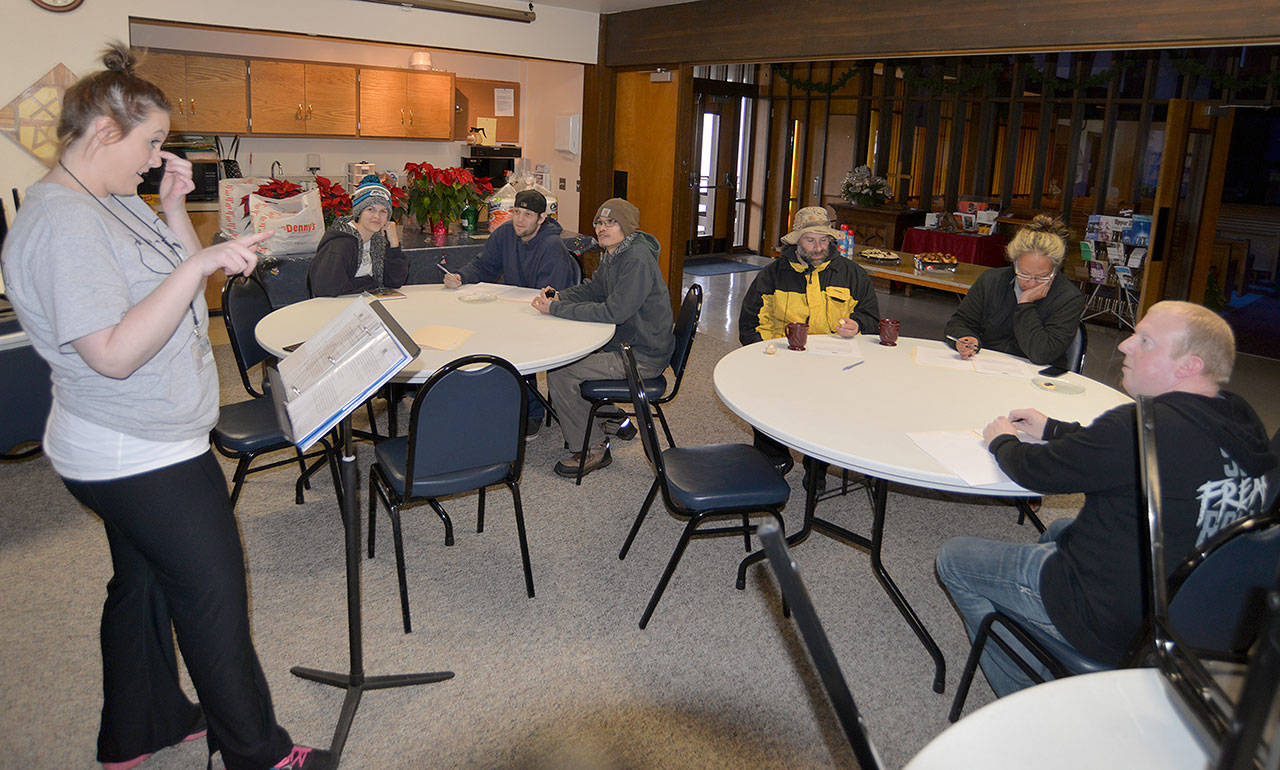For those looking to assist the homeless community, be it in shelters or while walking down the street, it can be challenging to know how to connect on a personal level with someone given the variety of traumas they may be dealing with. But at volunteer trainings for Revival of Grays Harbor, program co-founder Emily Reed says it’s usually as simple as being authentic and interested in what they have to say.
“A guest one time told me, ‘I like that you’re actually talking and listening to me,’ because there are people who you’ll have a conversation with and know it’s not genuine,” said Reed. “So make sure you’re repeating back what they say to you, and that you’re listening and having that conversation with them.”
Paul Campbell, who recently became homeless and wanted to help out more, considering he often stays at Revival’s shelter when it’s open, agreed with Reed’s advice, and said homeless people can be sensitive and many times just want you to be calm while talking to them.
“Be a good listener and try not to be hasty,” said Campbell, 47. “If you remain calm, they will, too. If they’re getting upset, and they see you starting to get upset, that’s going to build up more anxiety for them.”
Revival is a non-profit group that began in September 2016 and works to provide shelter, supplies and services to homeless people on Grays Harbor. They are based at First United Methodist Church in Aberdeen, which allows them to use their basement as an overnight shelter whenever there is especially cold or rainy weather. In order to work volunteer shifts at the shelter, people have to attend trainings, which are taught in the church and in recent weeks have contributed to Revival now having almost 100 trained volunteers.
There were seven people who showed up to Tuesday morning’s training at the church, where Reed spoke on subjects such as how to calm people who are acting out due to mental illness or as a reaction to drugs, how to build healthy relationships between volunteers and the guests, what to do in a medical emergency, and more broadly how the shelter functions. She also teaches how to administer Narcan, a drug which temporarily brings someone awake from a heroin overdose.
Reed said the trainings can even be helpful for those outside the shelter who wish to connect with homeless individuals walking around in public, who sometimes just want to have the kind of casual conversation that they often can’t find while living on the streets.
“It helps you understand how to treat people who aren’t going through the same things as you,” said Reed. “At the end of the day most of us have a warm, safe home to go to, so that one uncomfortable interaction that you have with a homeless person can change their day. So I ask people, ‘What are you going to do in those 30 seconds to give them the slight amount of comfort you feel when you get home?’”
When it comes to guests at the shelter who may be acting out, Reed and Campbell added that volunteers often don’t fear for their safety since the homeless guests who have become friends with them typically come to their aid.
“When people who come to the shelter know you, and have your back, that’s what happens,” said Campbell in regards to a recent altercation where he stood up to defend a staff member. “The guy wasn’t listening to [the staff member], and I was one of the first to stand up and say ‘Hey, you need to go now.’”
Reed also provides helpful tips for how to treat the visitors, such as not always calling them by their given names. She said while in the homeless community, people often develop a nickname, and become frightened if you call them by their real one.
“I created a friendship with a guest, and then went blonde,” said Reed. “So when he came in I said ‘Hey!’ to someone, but they had no idea who I was. So it totally freaked him out and went off the edge and asked ‘How do you know my name?’”
When one guest does start acting disruptive, Reed said they often advise a volunteer to take them outside briefly to smoke a cigarette and talk, without seeming noticeably concerned about the outbreak. For the most part though, her advice was to observe and get to know the guests without being pushy, while also keeping in mind the few rules they have such as not using drugs or visibly holding weapons.
“We do not take weapons from anyone, but they can’t be shown. If they have a knife, don’t take it from them, it’s probably the only way they have to protect themselves on the street, especially the women. But we don’t want them in the public, so you let them know, ‘Hey, we need to put that away.’”
This year’s final training will be Sunday at 2 p.m. in First United Methodist Church in Aberdeen. If you wish to donate anything like blankets, paper towels (which Reed says are of need) or more to Revival of Grays Harbor, there’s a drop off spot at 115 W. Heron St.



